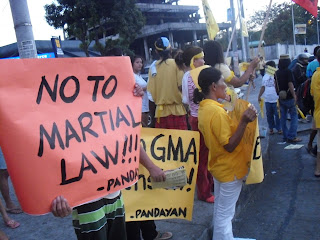2010 election ‘will make or break' Philippines
Pandayan para sa Sosyalistang PilipinasChairperson: Boy Nuera
April 6, 2010
In less than five weeks more than fifty million Filipinos will be electing new leaders who will steer the Philippines in the next six years with hope that they will deliver us from the political and economic rut that exacerbate corruption and poverty.
Thus, the May 2010 Elections is a crucial time in our country’s convoluted political history. On June 30, 2010, we expect to see the much awaited departure of President Gloria Macapagal-Arroyo who has reigned for over nine years with her gang; and the proclamation and swearing in of the new leaders. Hence, we must ensure that this first automated election shall be handled in an honest and credible way by the Commission on Elections.
This is a make or break time for the Philippines. This election, if done successfully, represents a clean break from the corrupt and morally bankrupt administration of Gloria Macapagal-Arroyo and her gang of greedy cronies; a break that will hopefully lead to a positive and new beginning.
Reports have been circulating of a ‘non-proclamation scenario’ due to a general failure of election or a selective failure of election due to the malfunction of precinct counting optical scan (PCOS) and other issues related to automation. We are worried that these machines will fail or will not read or count our votes accurately; some softwares are not reliable; some processes were done in non transparent way; and thousands of extra memory cards for the PCOS machines will be used to load up fake election results. These are serious allegations that the COMELEC should address. A faster way of counting our votes will be meaningless if the processes are under clouds of suspicion. A vote cast but not honestly counted is surely a waste.
Alarming is that we are being conditioned of a military takeover in case of a failure of election. Worst of all, they will install Gloria Macapagal-Arroyo as the interim head of a transition government. If these things happen, it is the end of the line for our country. We will surely be in an endless cycle of poverty, moral degradation and political mayhem.
We strongly believe that our democracy, with all its imperfection, is now under attack and Filipinos must fight tooth and nail against these evil plots. We believe that another uprising of the people is not far-fetched should they try these things.
We are urging the Filipino people to guard against any effort to rob us out of our votes through massive cheating or a naked grab of power that will perpetuate GMA and her gang to stay in power. We must show the international community that notwithstanding the election circus that we are in, we, as a nation, can collectively stand up and choose our leaders in a smooth and honest way.
We strongly believe that our democracy, with all its imperfection, is now under attack and Filipinos must fight tooth and nail against these evil plots. We believe that another uprising of the people is not far-fetched should they try these things.
We are urging the Filipino people to guard against any effort to rob us out of our votes through massive cheating or a naked grab of power that will perpetuate GMA and her gang to stay in power. We must show the international community that notwithstanding the election circus that we are in, we, as a nation, can collectively stand up and choose our leaders in a smooth and honest way.





